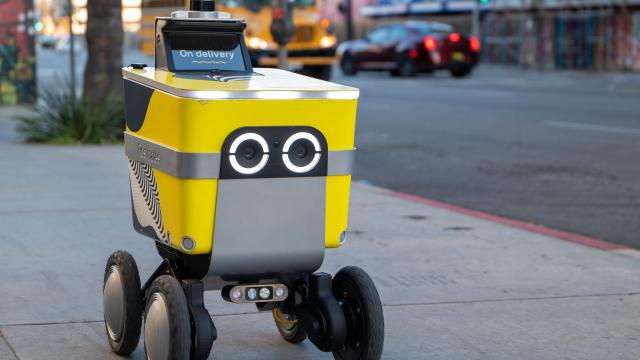It’s only been about a year since Uber Eats began deploying food delivery robots throughout select parts of Los Angeles and, already, concerns have been raised that the squat little automatons could become a police surveillance tool.
404 Media reports that a company called Serve Robotics, which contracts out its delivery robots to Uber Eats, recently delivered video footage to the city’s police department to assist with a criminal investigation. The criminal investigation involved one of Serve’s own robots because someone tried to steal the delivery bot off the street. The LAPD subpoenaed Serve for video footage related to the incident, which the company dutifully delivered. The footage was then used by police to identify two suspects who are said to have been involved in the attempted theft.
While this incident seems pretty innocuous, it certainly raises questions as to how these devices could be used in future criminal investigations. Companies that rely heavily on surveillance-infused autonomous technology—like Tesla—or privatized public safety companies—like Amazon Ring—have already become integral to police investigations across the country. Joseph Cox, who wrote 404’s story on Serve Robotics, argues that autonomous vehicles of the sort typified by Serve Robotics could quite “easily become moving surveillance devices.” Cox notes that Serve’s bots are recording their surroundings pretty much “constantly,” and that it’s not entirely clear how long the company retains these videos once they’ve been captured.
To explore the issue further, Cox interviewed a surveillance and privacy expert, Chris Gilliard, of the MacArthur Foundation, who had some thoughts on the matter. Gilliard told Cox:
… “absent some very specific policies, I think we can fully expect they [companies like Serve Robotics] will continue to share footage with the police. I wonder what would happen if the police came to them and made specific requests about surveillance in a particular area? Would they turn that down? I think these companies need to anticipate these issues and get ahead of them. I highly doubt they have a policy addressing that. I can easily envision that, and I didn’t put the product out. It’s not hyperbolic or farfetched, it’s a thing that’s very likely to happen when police want intelligence as these things proliferate.”
Meredith Whittaker, president of encrypted privacy messenger Signal, recently made the argument that AI technology “is surveillance technology”—i.e. new autonomous products rely on constant data collection about their surroundings and their interactions with humans to improve their own operations.
It only stands to reason that law enforcement agencies—which are constantly on the hunt for new tools to make their jobs more efficient and cost-effective—would find autonomous tech appealing because, like other private sector tools, it offloads surveillance work from their own forces onto the shoulders of everyday products that already exist ubiquitously in our communities. In short: whether food delivery bots end up being one of those tools or not, the AI revolution only means bigger and “better” surveillance to come.
